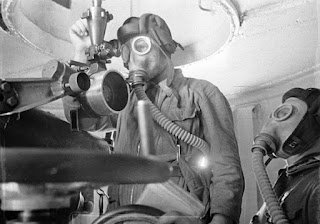Eighty years ago the British risk compromising Ultra intelligence to ward off gas warfare on the Eastern Front
Rumours that the Germans might use poison gas on the Eastern Front had been common for some months. The Soviets expressed their concern to the British; it was a topic on which they were unusually forthcoming. Churchill privately informed Stalin that he would treat the use of gas against the Soviets as though it were being used against Britain. GCHQ decycphered an ambiguous and non-urgent messsage suggesting that a gas attack might be under preparation. This was enough for Churchill to give the same commitment in a public speech that he had given confidentially. In practice he was warning Hitler that the RAF would drop gas bombs on German cities in retaliation. The British were worried enough at the possibility that either side might use gas on the Eastern Front to risk compromising the secrecy of Ultra intelligence.
The US Navy concentrated its aircraft carriers to blunt a Japanese thrust into the Coral Sea that threatened the vital port of Port Morseby on New Guinea, which could have serrved as the springboard for an invasion of Australia. Wisely, they abandoned plans to include older battleships in their task force, which would have been more of a hindrance. In a confused battle both sides lost a major carrier: USS Lexington and Shoho. The sinking of the latter inspired the much quoted cry by a USN flyer, "Scratch one flattop." In aggregate the Americans suffered greater losses than the Japanese, but achieved the strategical goal of finally thwarting a major Japanese offensive. The Battle of the Coral Sea confirmed that aircraft carriers were the key weapon in naval warfare and big-gun ships a thing of the past.
The British public were treated to the news that a limited number of horse races would be permitted, but this was partly offset by the statement that no special trains would be laid on to take race-goers from cities out to the racecourses. With fuel (in practice, coal) rationing still under active debate, the concession to public morale might have seemed frivolously wasteful; trains were then almost entirely coal-powered.
Whilst Lord Beaverbrook was still deep in the throes of promoting himself as the government's point-man on the Soviet alliance, he suffered a personal upset. His lavish country mansion, Cherkley Court where he had held court to his devoted and well-paid acolytes, was almost gutted by fire. The only consolation was that the archive of material relating to former prime minister and fellow Canadian, Andrew Bonar Law, was saved from the flames. But for the early death of Law, who was deep in Beaverbrook's pocket, the newsman might have been a significant political force in the 1920s.



Comments
Post a Comment